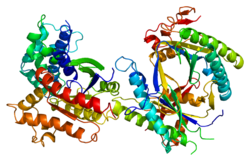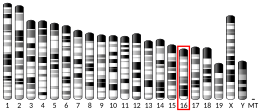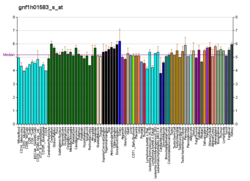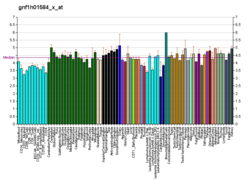Adenylyl cyclase type 5 is an enzyme that in humans is encoded by the ADCY5 gene.[5][6]
Interactions
editClinical significance
editMutations in ADCY5 are known to cause the following conditions:[8]
- Dyskinesia with orofacial involvement, autosomal recessive (DSKOR);
- Neurodevelopmental disorder with hyperkinetic movements and dyskinesia (NEDHYD).
References
edit- ^ a b c GRCh38: Ensembl release 89: ENSG00000173175 – Ensembl, May 2017
- ^ a b c GRCm38: Ensembl release 89: ENSMUSG00000022840 – Ensembl, May 2017
- ^ "Human PubMed Reference:". National Center for Biotechnology Information, U.S. National Library of Medicine.
- ^ "Mouse PubMed Reference:". National Center for Biotechnology Information, U.S. National Library of Medicine.
- ^ Raimundo S, Giray J, Volff JN, Schwab M, Altenbuchner J, Ratge D, Wisser H (October 1999). "Cloning and sequence of partial cDNAs encoding the human type V and VI adenylyl cyclases and subsequent RNA-quantification in various tissues". Clin Chim Acta. 285 (1–2): 155–61. doi:10.1016/S0009-8981(99)00067-4. PMID 10481931.
- ^ "Entrez Gene: ADCY5 adenylate cyclase 5".
- ^ Salim S, Sinnarajah S, Kehrl JH, Dessauer CW (May 2003). "Identification of RGS2 and type V adenylyl cyclase interaction sites". J. Biol. Chem. 278 (18): 15842–9. doi:10.1074/jbc.M210663200. PMID 12604604.
- ^ "UniProt". www.uniprot.org. Retrieved 2023-07-04.
External links
edit- Human ADCY5 genome location and ADCY5 gene details page in the UCSC Genome Browser.
Further reading
edit- Yoshimura M, Cooper DM (1992). "Cloning and expression of a Ca(2+)-inhibitable adenylyl cyclase from NCB-20 cells". Proc. Natl. Acad. Sci. U.S.A. 89 (15): 6716–20. Bibcode:1992PNAS...89.6716Y. doi:10.1073/pnas.89.15.6716. PMC 49574. PMID 1379717.
- Iwami G, Kawabe J, Ebina T, Cannon PJ, Homcy CJ, Ishikawa Y (1995). "Regulation of adenylyl cyclase by protein kinase A". J. Biol. Chem. 270 (21): 12481–4. doi:10.1074/jbc.270.21.12481. PMID 7759492.
- Haber N, Stengel D, Defer N, Roeckel N, Mattei MG, Hanoune J (1994). "Chromosomal mapping of human adenylyl cyclase genes type III, type V and type VI". Hum. Genet. 94 (1): 69–73. doi:10.1007/BF02272844. PMID 8034296. S2CID 6473135.
- Kawabe J, Iwami G, Ebina T, Ohno S, Katada T, Ueda Y, Homcy CJ, Ishikawa Y (1994). "Differential activation of adenylyl cyclase by protein kinase C isoenzymes". J. Biol. Chem. 269 (24): 16554–8. doi:10.1016/S0021-9258(19)89424-3. PMID 8206971.
- Scholich K, Barbier AJ, Mullenix JB, Patel TB (1997). "Characterization of soluble forms of nonchimeric type V adenylyl cyclases". Proc. Natl. Acad. Sci. U.S.A. 94 (7): 2915–20. Bibcode:1997PNAS...94.2915S. doi:10.1073/pnas.94.7.2915. PMC 20297. PMID 9096321.
- Sunahara RK, Dessauer CW, Whisnant RE, Kleuss C, Gilman AG (1997). "Interaction of Gsalpha with the cytosolic domains of mammalian adenylyl cyclase". J. Biol. Chem. 272 (35): 22265–71. doi:10.1074/jbc.272.35.22265. PMID 9268375.
- Scholich K, Wittpoth C, Barbier AJ, Mullenix JB, Patel TB (1997). "Identification of an intramolecular interaction between small regions in type V adenylyl cyclase that influences stimulation of enzyme activity by Gsα". Proc. Natl. Acad. Sci. U.S.A. 94 (18): 9602–7. Bibcode:1997PNAS...94.9602S. doi:10.1073/pnas.94.18.9602. PMC 23231. PMID 9275169.
- Dessauer CW, Tesmer JJ, Sprang SR, Gilman AG (1998). "Identification of a Gialpha binding site on type V adenylyl cyclase". J. Biol. Chem. 273 (40): 25831–9. doi:10.1074/jbc.273.40.25831. PMID 9748257.
- Barcova M, Speth C, Kacani L, Uberall F, Stoiber H, Dierich MP (1999). "Involvement of adenylate cyclase and p70(S6)-kinase activation in IL-10 up-regulation in human monocytes by gp41 envelope protein of human immunodeficiency virus type 1". Pflügers Arch. 437 (4): 538–46. doi:10.1007/s004240050815. PMID 10089566. S2CID 7620262.
- Speth C, Joebstl B, Barcova M, Dierich MP (2000). "HIV-1 envelope protein gp41 modulates expression of interleukin-10 and chemokine receptors on monocytes, astrocytes and neurones". AIDS. 14 (6): 629–36. doi:10.1097/00002030-200004140-00001. PMID 10807185. S2CID 22105709.
- Patke CL, Shearer WT (2000). "gp120- and TNF-alpha-induced modulation of human B cell function: proliferation, cyclic AMP generation, Ig production, and B-cell receptor expression". J. Allergy Clin. Immunol. 105 (5): 975–82. doi:10.1067/mai.2000.105315. PMID 10808179.
- Patrizio M, Colucci M, Levi G (2001). "Human immunodeficiency virus type 1 Tat protein decreases cyclic AMP synthesis in rat microglia cultures". J. Neurochem. 77 (2): 399–407. doi:10.1046/j.1471-4159.2001.00249.x. PMID 11299302. S2CID 24053412.
- Côté M, Guillon G, Payet MD, Gallo-Payet N (2001). "Expression and regulation of adenylyl cyclase isoforms in the human adrenal gland". J. Clin. Endocrinol. Metab. 86 (9): 4495–503. doi:10.1210/jcem.86.9.7837. PMID 11549699.
- Speth C, Schabetsberger T, Mohsenipour I, Stöckl G, Würzner R, Stoiber H, Lass-Flörl C, Dierich MP (2002). "Mechanism of Human Immunodeficiency Virus-Induced Complement Expression in Astrocytes and Neurons". J. Virol. 76 (7): 3179–88. doi:10.1128/JVI.76.7.3179-3188.2002. PMC 136041. PMID 11884542.
- Ludwig MG, Seuwen K (2003). "Characterization of the human adenylyl cyclase gene family: cDNA, gene structure, and tissue distribution of the nine isoforms". J. Recept. Signal Transduct. Res. 22 (1–4): 79–110. doi:10.1081/RRS-120014589. PMID 12503609. S2CID 36697419.
- Salim S, Sinnarajah S, Kehrl JH, Dessauer CW (2003). "Identification of RGS2 and type V adenylyl cyclase interaction sites". J. Biol. Chem. 278 (18): 15842–9. doi:10.1074/jbc.M210663200. PMID 12604604.
- Bauman AL, Soughayer J, Nguyen BT, Willoughby D, Carnegie GK, Wong W, Hoshi N, Langeberg LK, Cooper DM, Dessauer CW, Scott JD (2006). "Dynamic regulation of cAMP synthesis through anchored PKA-adenylyl cyclase V/VI complexes". Mol. Cell. 23 (6): 925–31. doi:10.1016/j.molcel.2006.07.025. PMC 3941446. PMID 16973443.
- Wang SC, Lai HL, Chiu YT, Ou R, Huang CL, Chern Y (2007). "Regulation of type V adenylate cyclase by Ric8a, a guanine nucleotide exchange factor". Biochem J. 406 (3): 383–8. doi:10.1042/BJ20070512. PMC 2049038. PMID 17593019.






